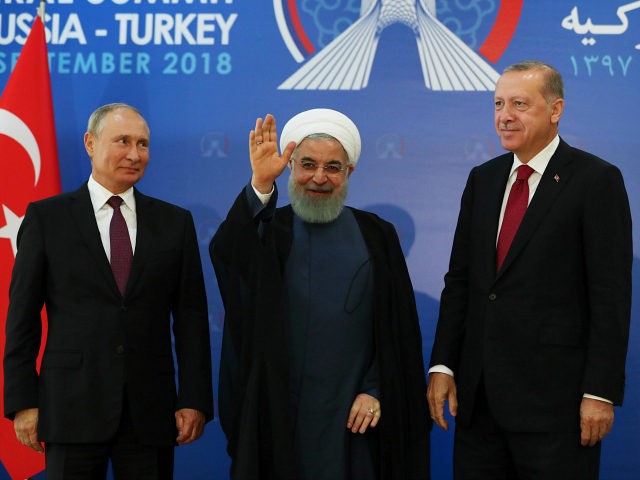The presidents of Russia, Turkey, and Iran met in Tehran to discuss Syria policy on Friday, even as the first round of airstrikes in a massive campaign to capture the last major insurgent province of Syria was launched.
The Associated Press judged that the Tehran summit could “determine whether diplomacy halts any military action” in Idlib — which the United States, United Nations, and various Western powers have warned could become a humanitarian nightmare:
Iran wants to keep its foothold in the Mediterranean nation neighboring Israel and Lebanon. Turkey, which backed opposition forces against Syrian President Bashar Assad, fears a flood of refugees fleeing a military offensive and destabilizing areas it now holds in Syria. And Russia wants to maintain its regional presence to fill the vacuum left by America’s long uncertainty about what it wants in the conflict.
“The Tehran summit can produce peace and reconciliation in Syria or it can deepen the mess created by endless bouts of violence mainly instigated by the Assad regime,” Ilnur Cevik, a senior adviser to Erdogan, wrote in the Daily Sabah newspaper.
Northwestern Idlib province and surrounding areas are home to about 3 million people — nearly half of them civilians displaced from other parts of Syria. That also includes an estimated 10,000 hard-core fighters, including al-Qaida-linked militants.
For Russia and Iran, both allies of the Syrian government, retaking Idlib is crucial to complete what they see as a military victory in Syria’s civil war after Syrian troops recaptured nearly all other major towns and cities, largely defeating the rebellion against Assad.
…
For Turkey, the stakes couldn’t be higher. Turkey already hosts 3.5 million Syrian refugees and has sealed its borders to newcomers. It has also created zones of control in northern Syria and has several hundred troops deployed at 12 observation posts in Idlib. A government assault creates a nightmare scenario of potentially hundreds of thousands of people, including militants, fleeing toward its border and destabilizing towns and cities in northern Syria under its control.
“We don’t want Idlib to turn into a bloodbath,” Turkish President Recep Tayyip Erdogan said at the summit. “Any attack on Idlib would result in a catastrophe. Any fight against terrorists requires methods based on time and patience.”
Erdogan even tried quoting a Persian poet at Rouhani: “If you’ve no sympathy for human pain, the name of a human you cannot retain.”
Russian President Vladimir Putin and Iranian President Hassan Rouhani rejected Erdogan’s plea, insisting they would do whatever was necessary to defeat insurgent forces and secure Syrian dictator Bashar Assad’s rule.
“Fighting terrorism in Idlib is an unavoidable part of the mission of restoring peace and stability to Syria,” said Rouhani.
“The legitimate Syrian government has a right and must eventually take under control of its entire national territory,” Putin declared.
Although Putin demanded the “total annihilation of terrorists in Syria” and Rouhani urged “cleansing the Idlib region of terrorists” — by which the two authoritarian leaders mean all forces opposed to Assad — they acknowledged the importance of minimizing civilian casualties and did not completely rule out the possibility of ceasefire negotiations.
Putin ominously accused Western forces of protecting terrorists and faking chemical weapons attacks to discredit the Syrian regime. He also charged militants in Idlib province with preparing their own chemical weapons attacks. U.S. officials have said there is no evidence the rebels in Idlib possess chemical weapons.
The United Nations envoy to Syria optimistically interpreted the “signals” from Tehran as indicating Russia, Turkey, and Iran are still looking for a way to avoid bloodshed in Idlib.
Airstrikes hammered rebel positions in Idlib as the summit got underway. Damage was reported to a building used by an Islamist militia allied with Turkey called Ahrar al-Sham. According to Syrian media, the airstrikes also hit “al-Qaeda militia” targets in the area.

COMMENTS
Please let us know if you're having issues with commenting.